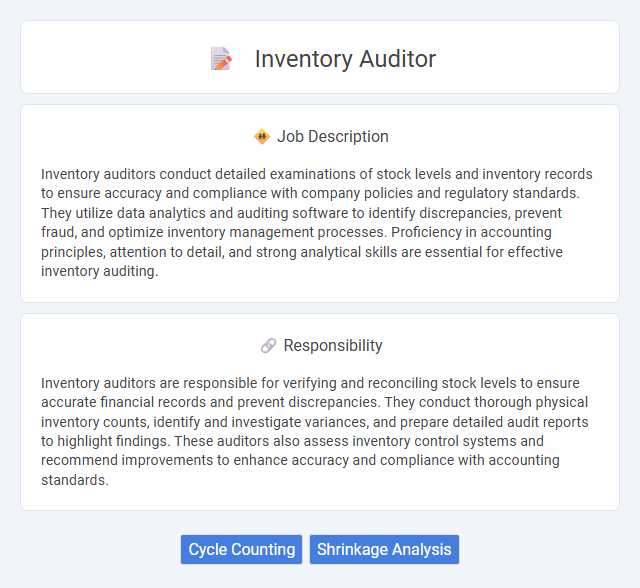
Inventory auditors conduct detailed examinations of stock levels and inventory records to ensure accuracy and compliance with company policies and regulatory standards. They utilize data analytics and auditing software to identify discrepancies, prevent fraud, and optimize inventory management processes. Proficiency in accounting principles, attention to detail, and strong analytical skills are essential for effective inventory auditing.
Individuals who are detail-oriented and possess strong analytical skills are likely to be well-suited for an Inventory Auditor position. Those who enjoy working independently and have a high level of accuracy and organizational ability may find this job aligns with their strengths. People who struggle with repetitive tasks or lack focus might have difficulty thriving in this role.
Qualification
Inventory auditor roles require a strong background in accounting or finance, often supported by a bachelor's degree in these fields or in business administration. Candidates must demonstrate proficiency in inventory management software, data analysis, and internal control procedures, ensuring accuracy and compliance. Relevant certifications such as CPA (Certified Public Accountant) or CIA (Certified Internal Auditor) enhance qualifications and job performance.
Responsibility
Inventory auditors are responsible for verifying and reconciling stock levels to ensure accurate financial records and prevent discrepancies. They conduct thorough physical inventory counts, identify and investigate variances, and prepare detailed audit reports to highlight findings. These auditors also assess inventory control systems and recommend improvements to enhance accuracy and compliance with accounting standards.
Benefit
An inventory auditor likely enhances operational efficiency by identifying discrepancies and ensuring accurate stock records, which may prevent losses and reduce costs. They probably contribute to improved financial accuracy, supporting better decision-making for inventory management and budgeting. Their role might increase compliance with internal controls and regulatory standards, minimizing the risk of audits and penalties.
Challenge
Inventory auditor roles likely involve the challenge of ensuring accuracy and completeness in stock records amid complex supply chains and fluctuating inventory levels. The auditor may often face difficulties identifying discrepancies between physical counts and system data due to human error or fraud. Navigating tight deadlines for audits while maintaining attention to detail can also present a significant challenge in this position.
Career Advancement
Inventory auditor positions offer a clear pathway for career advancement within finance and supply chain management. Professionals can progress to roles such as senior auditor, inventory control manager, or internal audit director by developing expertise in risk assessment, compliance, and inventory optimization. Gaining certifications like Certified Internal Auditor (CIA) or Certified Supply Chain Professional (CSCP) enhances promotion prospects and leadership opportunities.
Key Terms
Cycle Counting
Inventory auditors specializing in cycle counting systematically verify stock accuracy by conducting periodic physical counts of inventory items to identify discrepancies and prevent stockouts or overstock situations. They analyze count data, reconcile variances with records, and recommend process improvements to enhance inventory management accuracy. Proficiency in inventory management software and strong attention to detail are essential for ensuring data integrity and supporting effective supply chain operations.
Shrinkage Analysis
Inventory auditors specializing in shrinkage analysis meticulously examine discrepancies between recorded and actual stock levels to identify causes of inventory loss. They employ data analytics and physical audits to detect patterns of theft, damage, or administrative errors, ensuring accurate valuation of assets. Their findings help implement controls that reduce shrinkage and improve overall inventory accuracy.
 kuljobs.com
kuljobs.com